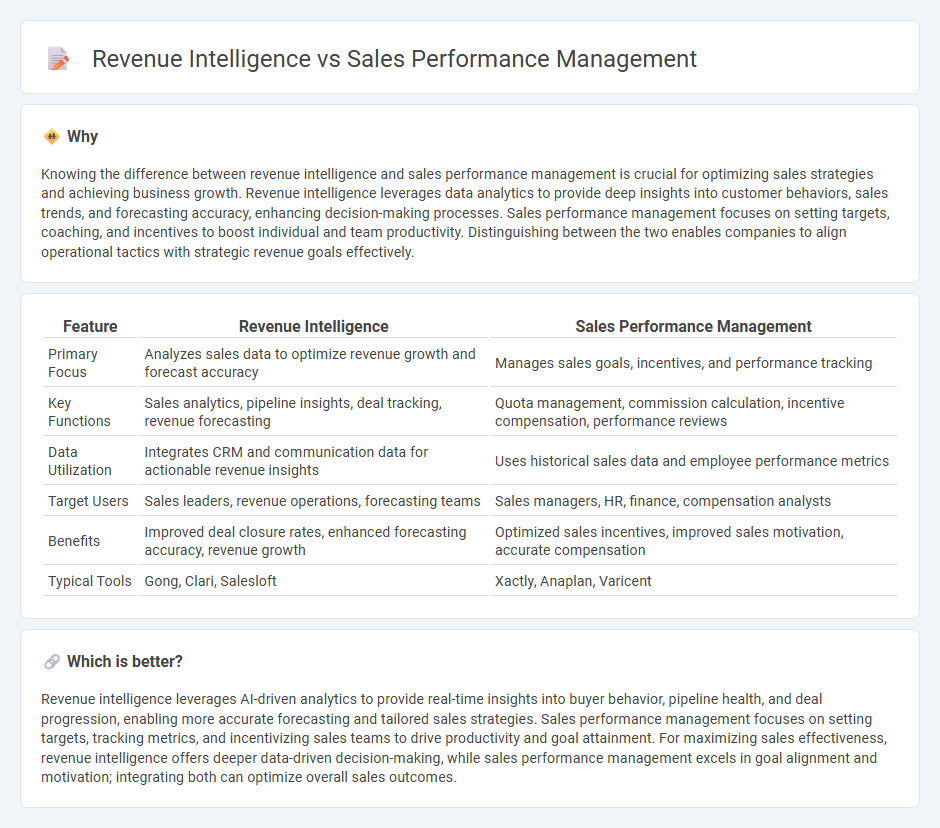
Revenue intelligence leverages AI-driven data analytics to provide actionable insights into customer behavior, sales activities, and pipeline health, enhancing forecasting accuracy and decision-making. Sales performance management focuses on setting sales targets, monitoring employee performance, and incentivizing teams to align actions with corporate goals and increase productivity. Explore how integrating revenue intelligence and sales performance management can transform your sales strategy.
Why it is important
Knowing the difference between revenue intelligence and sales performance management is crucial for optimizing sales strategies and achieving business growth. Revenue intelligence leverages data analytics to provide deep insights into customer behaviors, sales trends, and forecasting accuracy, enhancing decision-making processes. Sales performance management focuses on setting targets, coaching, and incentives to boost individual and team productivity. Distinguishing between the two enables companies to align operational tactics with strategic revenue goals effectively.
Comparison Table
| Feature | Revenue Intelligence | Sales Performance Management |
|---|---|---|
| Primary Focus | Analyzes sales data to optimize revenue growth and forecast accuracy | Manages sales goals, incentives, and performance tracking |
| Key Functions | Sales analytics, pipeline insights, deal tracking, revenue forecasting | Quota management, commission calculation, incentive compensation, performance reviews |
| Data Utilization | Integrates CRM and communication data for actionable revenue insights | Uses historical sales data and employee performance metrics |
| Target Users | Sales leaders, revenue operations, forecasting teams | Sales managers, HR, finance, compensation analysts |
| Benefits | Improved deal closure rates, enhanced forecasting accuracy, revenue growth | Optimized sales incentives, improved sales motivation, accurate compensation |
| Typical Tools | Gong, Clari, Salesloft | Xactly, Anaplan, Varicent |
Which is better?
Revenue intelligence leverages AI-driven analytics to provide real-time insights into buyer behavior, pipeline health, and deal progression, enabling more accurate forecasting and tailored sales strategies. Sales performance management focuses on setting targets, tracking metrics, and incentivizing sales teams to drive productivity and goal attainment. For maximizing sales effectiveness, revenue intelligence offers deeper data-driven decision-making, while sales performance management excels in goal alignment and motivation; integrating both can optimize overall sales outcomes.
Connection
Revenue intelligence integrates data analytics and machine learning to provide actionable insights into sales activities, enabling sales performance management to optimize team productivity and forecast accuracy. By continuously analyzing customer interactions and sales processes, revenue intelligence identifies trends and bottlenecks that inform performance management strategies. This connection enhances decision-making, driving higher revenue growth and improved sales outcomes.
Key Terms
**Sales Performance Management:**
Sales Performance Management (SPM) focuses on optimizing sales team efficiency through goal setting, incentive compensation, and performance analytics to drive revenue growth. It integrates data from CRM systems and sales activities to align sales behaviors with business objectives, ensuring accountability and motivation. Discover how advanced SPM solutions can transform your sales results and boost profitability.
Quota Attainment
Sales performance management centers on optimizing quota attainment through structured goal setting, ongoing coaching, and performance tracking, enabling sales teams to meet or exceed targets consistently. Revenue intelligence leverages AI-driven analytics to provide actionable insights from sales data, enhancing forecasting accuracy and identifying opportunities for quota acceleration. Explore how integrating these approaches can maximize quota attainment and drive revenue growth effectively.
Incentive Compensation
Sales performance management (SPM) centers on optimizing incentive compensation through structured bonus and commission plans that align sales behaviors with company goals. Revenue intelligence leverages AI-driven analytics to provide real-time insights into sales activities, enhancing transparency and forecasting accuracy for incentive payouts. Explore how integrating these approaches can revolutionize your incentive compensation strategy for better sales results.
Source and External Links
What Is Sales Performance Management? Examples and Tips - Sales performance management (SPM) is a process to track, manage, and improve sales teams' work, including sales planning, compensation incentives, quota management, and territory planning to align reps with goals and boost motivation and results.
What Do You Need to Know About Sales Performance Management? - SPM is a strategic approach involving sales planning, goal setting, ongoing performance reviews, and data-driven feedback to continuously improve sales team effectiveness and align efforts toward business objectives.
What is Sales Performance Management (SPM)? - Xactly - SPM systems provide real-time sales performance tracking, dashboards, benchmarking against industry standards, and tools to help leadership make informed decisions that increase sales productivity and revenue predictability.
 dowidth.com
dowidth.com